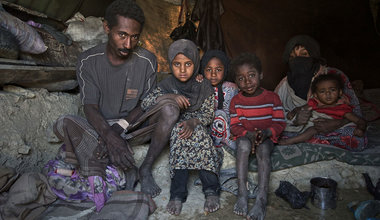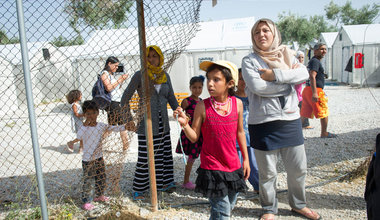Ireland’s migrant past ‘tragic present for so many,’ Foreign Minister tells UN
 Addressing the United Nations General Assembly, Ireland’s Minister of Foreign Affairs and Foreign Trade today highlighted his country’s response to the ongoing refugee and migrant crisis.
Addressing the United Nations General Assembly, Ireland’s Minister of Foreign Affairs and Foreign Trade today highlighted his country’s response to the ongoing refugee and migrant crisis.
“I am acutely conscious, as I stand here […], of my own country’s long experience of emigration over several centuries,” Minister Charles Flanagan told the Assembly’s annual debate. “Indeed, on the newly restored lawn just outside this building a haunting bronze sculpture, Arrival, depicts a huddled group of Irish emigrants ready to disembark in New York after fleeing starvation and poverty in their native Ireland,” he noted.
“Our own history as a people forms the enduring backdrop to our foreign policy agenda. That part of our past is, unfortunately, the tragic present for so many,” he said.
The vast scale and sustained nature of the movement is, at times, bewildering and threatens to overwhelm rules-based migration systems, he said, citing a wide array of issue to overcome at the same time – the harrowing violence in Syria; the barbarism of the Islamic State of Iraq and the Levant (ISIL/Da’esh); the collapse of order within Libya; the practices of ruthless people smugglers; and persistent poverty and inequality in many parts of Africa.
Ireland is responding to the migration crisis in a variety of ways, Mr. Flanagan said, including prioritization of funding humanitarian relief and provision of more than €60 million in support of the Syrian people in the region, most of it through UN organizations.
Ireland has deployed its navy’s ships to the Mediterranean to assist with search and rescue missions, and is participating in the EU programme to resettle refugees fleeing conflict. Here at UN Headquarters, Ireland acted as co-facilitator, alongside Jordan, to deliver agreement on the New York Declaration for Refugees and Migrants, adopted at the UN earlier this week, he said.
He stressed that a multilateral approach is the only one that can work, and that is why the UN must demonstrate its capacity to deliver the solutions. The Sustainable Development Goals (SDGs), which the UN agreed one year ago following a successful co-facilitation process by Ireland and Kenya, have the capacity when implemented, to address many of the root causes of migration by ending poverty, reducing inequality, and responding to climate change.
 ONU
ONU







